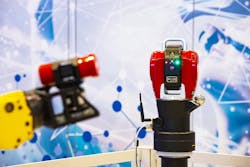API ROBOT PERFORMANCE MEASUREMENT AND CALIBRATION SOLUTION
Laser measurement technology company, API, announces the launch of a Laser Tracker based industrial robot performance and calibration solution. The API Robot Measurement Solution (RMS) provides the complete toolkit necessary to verify robot accuracy to the ISO 9283 standard, allowing on-site, in-situ, robot performance verification and enhanced robot calibration to be performed.
Industrial robots calibrated with the API’s RMS system during extensive development testing have exhibited an improvement in positioning accuracy of up to 12 times.
Robot Performance Measurement: Quantifies an installed robot performance in accordance with the ISO 9283 Standard. Robot performance verification is the process of identifying the real geometric parameters present in the kinematic structure of a robot, such as relative positions of robot joint links. A total of 14 static and dynamic tests are used to quantify a robot’s absolute performance. This performance check determines actual robot performance against the original OEM specifications quickly determining robot accuracy, repeatability and identifying inherent robot joint wear.
Robot Calibration: Robots are historically repeatable but not accurate. Today many automation tasks require improved process control and a higher order of accuracy than that delivered by robot manufacturers. For instance, aerospace machining, drilling and assembly operations are increasingly performed by robots integrated into sophisticated and process critical manufacturing cells.
Typical applications for enhanced robot positional accuracy include machining, drilling, grinding, welding, cutting, inspection, deburring and 3D printing. Activities such as robot cell “cloning”, “cell mirroring” or “robot swapping” also benefit from enhanced robot accuracy by reducing manual programming time and allowing for seamless and precise off-line robot programming. Accurate robots improve process capability as a robot positions more accurately to its commanded position also negating the physical ‘touch-up’ of robot programs.
The delivered solution includes API’s 6 DoF (Degrees of Freedom) RADIAN Laser Tracker complimented by the API Smart Track Sensor, which mounts directly to the robot’s end effector, allowing the laser tracker to dynamically collect X, Y, Z, and I, J, K data for each robot position in space accurately and automatically.
The robot is automatically driven to discrete positions using API’s Robot Performance Measurement (RPM) Software providing fully automated measurements and data acquisition and allows customization of the actual workspace under calibration. Up to 30 robot parameters can be calibrated in a completely automated run-time.
API President Joe Bioty comments, “We expect our RMS robot accuracy verification and calibration solution to be of significant interest to robot system integrators, robot end users and robot OEMs, particularly since robot uptake is increasing dramatically in North America, while at the same time manufacturing operations are looking to more tightly control production processes.”
API’s RMS provides a single seamless solution for robot process performance enhancement and optimization. RMS can be supplied as a Robot Performance Measurement (RPM) module or combined Robot Calibration (RoboCal) and Robot Path Plan Enhancement (PPE) module. Robocal offers both DH kinematic model and a volumetric error compensation model (VEC) to update robot accuracy using collected data. Once a Robot has been calibrated existing robot path programs can be automatically updated driving the robot to its corrected calibrated positions.
RMS provides access to an extensive library of industrial robots from over 30 manufacturers.

